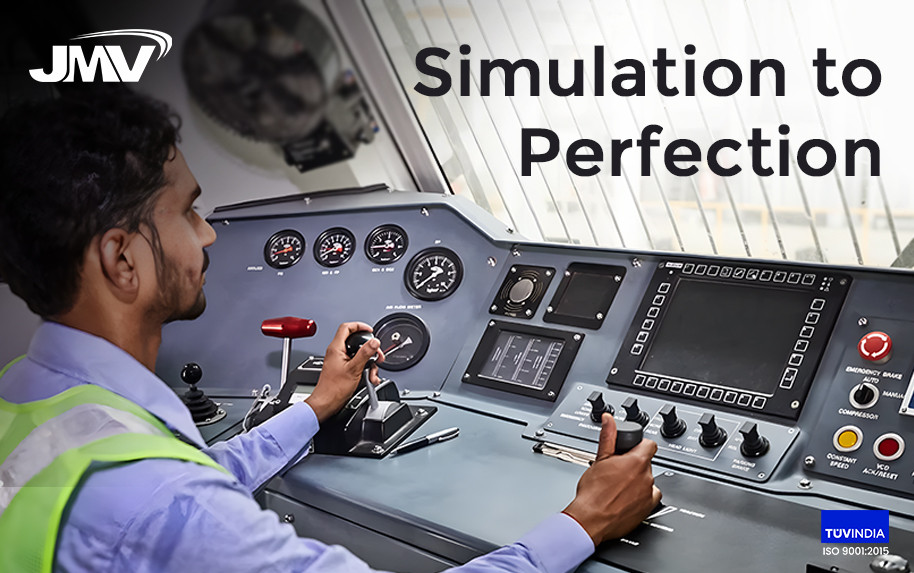

12February
Discover the future of Loco Pilot training with advanced simulators that replicate real-world challenges, from extreme weather to emergencies.
Imagine being able to train in a virtual environment that mirrors every twist, turn, and challenge you might face on the railway. Picture a simulator that doesn’t just mimic the operation of a train, but also simulates extreme weather conditions, different train models, and emergency scenarios—all without ever leaving the safety of a training facility. Welcome to the future of Loco Pilot training, where immersive, hands-on learning is pushing the boundaries of what’s possible.
What is a Loco Simulator?
A Loco Simulator is a state-of-the-art training tool designed to replicate the physical driving cab of Electric Locomotives and EMU-MEMU. With its full-motion base, the simulator mimics real-world train dynamics, allowing trainees to experience driving, accelerating, braking, and handling operational tasks. By providing a lifelike environment, these simulators help future engineers and Loco Pilots hone their skills without the risk of real-world consequences.
These simulators are packed with features that ensure every training session feels like a real-world scenario. From the night mode with headlight operation to sun glare and broken glass simulations, trainees are exposed to a variety of conditions that could potentially arise during actual operations, making them prepared for anything.
The Magic Behind the Simulation
At the heart of these simulators lies realism—each session is designed to give Loco Pilots a feel of what it’s like to operate a train under any circumstances. Whether it's navigating a rainstorm with varying intensities, managing operations during a thunderstorm with lightning, or dealing with sun glare conditions, Loco Simulators provide a level of immersion that traditional methods simply can't match.
These simulations help prepare trainees for every situation they might encounter in the real world, without any of the risks involved in live training. It’s like having a training ground where you can test, learn, and improve before ever setting foot on the actual tracks.
Why Loco Simulators Are the Future of Train Operations
Loco Simulators are a game-changer in Loco Pilot training. Here’s how:
1. Enhanced Training:
Loco simulators offer a comprehensive and immersive experience, allowing pilots to practice and refine their skills in a controlled and safe environment. By simulating real-world challenges, trainees gain hands-on experience without the risk associated with on-track training.
2. Safety Improvement:
Simulators replicate realistic scenarios, enabling Loco Pilots to practice emergency protocols and safety measures. Training in such an environment ensures they are fully prepared for unexpected situations, enhancing overall safety on the tracks.
3. Operational Efficiency:
Simulators enable Loco Pilots to focus on improving driving, accelerating, and braking techniques. With frequent practice, they can master the operational aspects of train driving, contributing to greater efficiency in daily operations.
4. Cost Savings:
Training on a simulator significantly reduces the need for actual locomotives, fuel, and maintenance costs associated with traditional on-track training. It’s a more economical approach that ensures effective learning while optimizing resources.
5. Skill Analysis:
Loco Pilots can use simulators to assess their driving skills and identify areas for improvement. The feedback provided during simulator sessions helps them refine their techniques, ensuring better performance on the actual tracks.
6. Realistic Scenarios:
The simulator replicates train dynamics and various challenging conditions, allowing trainees to experience scenarios they may face during real operations. This realism provides a more effective training experience compared to theoretical learning.
7. Punctuality Improvement:
By focusing on speed control, schedule adherence, and operational strategies, Loco Pilots can enhance punctuality and ensure timely train services. This kind of training helps them understand the importance of meeting deadlines while maintaining safety.
8. Energy Conservation Training:
Simulators allow trainees to learn energy-efficient driving techniques, reducing the environmental impact of train operations. By training in energy conservation, Loco Pilots contribute to a greener future for railway transportation.
9. Adaptability to Various Locomotives:
The simulator can be customized to replicate different types of locomotives, giving Loco Pilots exposure to a variety of train models and configurations. This adaptability prepares them to operate a wide range of trains with confidence.
10. Continuous Learning:
Loco Simulators aren’t just for initial training; they are an ongoing resource for continuous learning. Loco Pilots can use them to stay updated on new technologies, best practices, and operational techniques, ensuring their skills remain relevant throughout their careers.
The Future of Loco Pilot Training is Here
Incorporating Loco Simulators into training programs is a forward-thinking step that is setting new standards for the rail industry. It's not just about operating a train—it’s about mastering it. With real-time feedback, emergency response drills, and immersive scenarios, Loco Pilots are better prepared for anything they might face on the tracks. They’re not just learning how to drive—they’re learning how to excel in every situation.
As railways worldwide continue to grow and evolve, Loco Simulators are becoming an essential tool in shaping the engineers and Loco Pilots of tomorrow. Through continuous learning, realistic scenarios, and cutting-edge technology, these simulators are creating a new generation of Loco Pilots who are not only skilled operators but also innovative problem-solvers ready to meet the demands of modern rail transport.
Welcome to the future of training. The tracks are waiting. Are you ready to drive?












.png)




.png)
.png)
.png)


